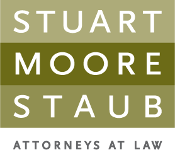Credit and Copyright Notice
This web site was created by Stuart | Moore | Staub, designed by iii DESIGN. This entire site is copyright ©2017 by Stuart | Moore | Staub (the Firm). All rights are reserved. In addition, certain parts of this site may also be copyrighted by other parties.
Disclaimer
The materials on this Web site are provide as information only and do not constitute legal advice. The content of this web site does not necessarily reflect the opinions of the Firm or any of its attorneys or clients and is not guaranteed to be correct or up-to-date.
The materials on this Web site should not be considered as legal advice or as a substitute for legal advice. They are not intended nor do they create an attorney-client relationship. The materials on this Web site are general in nature and should not be acted upon or relied on for information without seeking the advice of an attorney.
Receipt of email from this site by the Firm does not create an attorney-client relationship. We would be pleased to correspond with you via email. However, correspondence through this site or otherwise in connection with a matter for which we do not already represent you may not be treated as privileged or confidential. In some jurisdictions this Web site may be considered advertising. The hiring of a lawyer is an important decision that should not be based solely upon advertisements. Before you make such a decision, we would be pleased to send you, at no charge, written information about our qualifications and experience.
IRS CIRCULAR 230 DISCLOSURE:
The IRS has issued new rules that will affect how we communicate with you, our client. The rules apply whenever a practitioner provides written advice, including e-mails, faxes, and letters, on tax issues. While the rules are motivated by the government’s well-founded concern with abusive tax shelters, they will apply to advice given on many common and accepted transactions. The rules grew out of the government’s decision to attack the mechanisms used by tax shelter promoters to sell abusive tax shelters. The new rules address the practice of promoters to obtain boiler-plate opinions for tax shelters. Taxpayers engaging in abusive transactions use these types of opinions to escape tax penalties of 20 percent or more, on top of what they owe in taxes, by claiming they “reasonably” and “in good faith” relied on the tax opinion for their belief that the transaction was permissible.
In the new IRS rules, clients cannot rely on a tax opinion for protection from penalties unless the practitioner provides a comprehensive opinion that considers and discusses:
• All relevant facts and applicable law,
• The relationship between the facts and the law,
• A conclusion as to the legal consequences of each tax issue, and
• The likelihood that the taxpayer will prevail if the IRS challenges the transaction.
The new rules apply to tax advice for transactions that have a “significant purpose” of tax avoidance. This standard is vague and uncertain, in large part because the IRS did not want to create any loopholes. Consequently, the new rules may sweep in many routine, non-abusive transactions. The penalties to practitioners can be severe for providing written advice that does not meet these requirements, including disbarment from practice before the IRS. Because of the new rules, the cost of securing a comprehensive opinion will be higher. An alternative to writing an expensive opinion is to include a disclaimer on written advice furnished to the client. This disclaimer will state that the client cannot rely on the opinion for protection from tax penalties. Accordingly, effective February 15, 2006, this firm will routinely include the following language in written communications:
“This written advice is not intended or written to be used, and it cannot be used by any taxpayer, for the purpose of avoiding penalties that may be imposed on the taxpayer.”
Even with this legend, there are other penalty defenses to penalties. You will not automatically be penalized if the IRS challenges a transaction. Please be assured that we will continue to act diligently to meet your needs. The use of this legend does not change the quality of our service and the advice you have come to expect from us. In appropriate cases, after consultation with you, we will provide a comprehensive opinion that meets the new rules.








